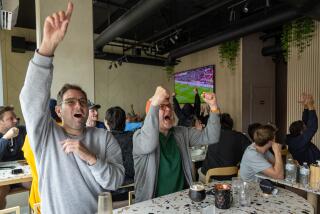No Matter the Country, Football Is Still the King
- Share via
Ten days recently spent in England reconfirmed that:
a) The beer there is better.
b) It rains a lot in Manchester.
c) The food isn’t so bad, but it helps if you like it fried or mixed with curry. Or, better yet, if you like fried curry.
d) England and America are countries separated by a common word. And that word, of course, is “football.”
Their football is the sport we call soccer, even though soccer is a game played almost exclusively with the feet, and the sport we call football involves abnormally large humans gearing up in heavy camouflage and socking the socks off one another. It’s a confusing thing, always has been, and that’s one reason why various stabs at crossover appeal have suffered for lack of a handy translator.
The seasons kick off about the same time, theirs beating ours to the starting gate by a few weeks. In both countries, football is king, with fan support built in, long standing and rabid. But only in England is this fact considered enough of a good thing.
I timed my trip to end just before the start of the NFL season. I may need to rethink this for the future. After spending 10 days in the heart of the English Premier League, among understated TV commentators and fans who need nothing more than a season schedule to spark their interest, jetting straight back into the Britney-Aerosmith-Rush circus was a cultural head slap that still has my ears ringing.
Game day is an entirely different experience in England. Traditionally, it begins with a breakfast of scrambled eggs, fried meat, fried potatoes, stewed tomatoes, baked beans, toast and tea. A bit heavy, yes, but terrace chanting requires carbo loading -- and it beats Pop-Tarts and Folgers any day of the week.
While waiting for this stomach load to digest, the popular pregame show, “Soccer AM,” is useful. The show is co-hosted by Helen Chamberlain, who is blond, photogenic, in her 30s, carries the nickname “Hells Bells” and is rumored to have the club crest of her favorite team, tiny Torquay United, tattooed in a delicate region.
ABC went a similar route with its “Monday Night Football” sideline reporter assignment, up to a point. Chamberlain knows her sport, knows how to conduct an interview, can ad-lib, and when she draws laughs, it’s usually intentional.
After “Soccer AM,” it’s off to the local pub, where the weekly Pint, Pass and Kick competition can officially begin. Pubs are an integral part of the English football experience, serving the same basic purpose as the NFL tailgate, except:
* Boddington’s ale is rarely served at an NFL tailgate party. English football 1, American football nil.
* Generally speaking, there is no place to tailgate at an English football match. With so many stadiums wedged inside residential neighborhoods, much like Fenway Park and Wrigley Field, few have the space for the village-sized parking lots that surround NFL playgrounds.
One exception is Bolton’s Reebok Stadium, where I watched the struggling home side wrestle to a scoreless draw against Charlton Athletic. Big NFL influence at Bolton: spacious American-style parking lot, plush American-style luxury suites ... even pompom-shaking American-style cheerleaders.
I saw several matches in Manchester, where the city’s Premier League allegiances closely mirror the NBA allegiances in Los Angeles.
Manchester United stakes out the role of the Lakers -- rich and renowned, loaded with star talent, with fans left almost complacent by success. Many left the match early, deeming a 1-0 triumph over the last-place Wolverhampton Wanderers unworthy of their full attention.
Manchester City is the Clippers. While United was winning eight Premier League championships in the last 11 years, City was relegated to the First Division, then to the Second, before clawing its way back to the top flight, never a very secure position for City.
Tempting the fates, City just opened a new 48,000-seat stadium, which helps when the visiting name on the marquee is Arsenal, but extravagant overkill should the team get dumped back into a lower division.
City fans, however, are legendary for their optimism and perseverance. Despite supporting a team that hasn’t won a top-flight championship since the 1960s, a favorite City terrace chant goes like this:
“City! City!
“The best team in the land
“And all the world!”
It is sung, religiously, at every game, home and away, without the slightest hint of irony.
The fanzine is another English football tradition that hasn’t quite translated across the pond. Written and published by fans for fans, these publications vary wildly in production quality. Rule of thumb: the bigger the team, the slicker the fanzine, but commonly dosed with passion, a sardonic sense of humor and an unrelenting hatred for that team’s archrival.
Fanzines are so big in England, several UK-based NFL fan clubs have taken to printing their own about their favorite American football teams. Sportspages bookstore in London -- the best sports bookstore I’ve ever seen -- carried two NFL fanzines, one about the Washington Redskins, one about the Dallas Cowboys.
“Redskins Review” pretty much plays it straight, offering the Washington Redskins U.K. Supporters Club mostly reprints of U.S. newspaper stories about the team. The Cowboy publication is more along traditional fanzine lines. It is titled, “Barry Switzer Ate My Hamster Too!”
In typical style, the August edition of the Hamster delighted in the Redskins’ legal hassle over the Redskin trademark, with the fanzine’s editor chortling, “Who cares? They will still be the same [lousy team] whatever they are called!”
That emotion is universal to football, no matter what you call it, or how or where you play it.
More to Read
Go beyond the scoreboard
Get the latest on L.A.'s teams in the daily Sports Report newsletter.
You may occasionally receive promotional content from the Los Angeles Times.










